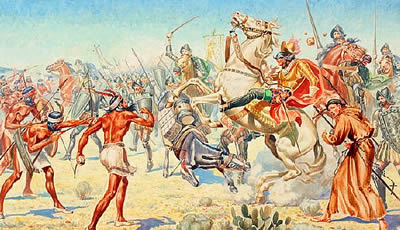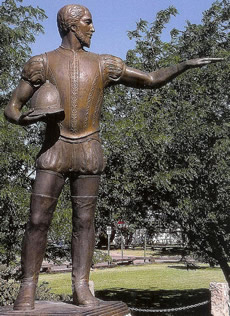World History
Francisco Vásquez de Coronado was the Spanish explorer who led the expedition looking for the fabled Seven Cities of Cibola rumored to be located in south-western North America. Coronado served in the entourage of Antonio de Mendoza, Spain’s first viceroy to Mexico.
He served as governor of New Galicia from 1538–39, when he was named the commander of the expedition Mendoza was putting together to look for the Seven Cities of Cibola. The expedition spent 1540–42 looking for the cities, but did not find them. After the expeditions returned to Mexico, Coronado faded into obscurity and died in 1554.
Born into a wealthy family in Burgos, Spain, in 1510, Coronado decided to go to the New World to make his fortune. He arrived in Mexico in 1535 as part of Mendoza’s following, where he was appointed as governor of New Galicia in August 1538. New Galicia was a frontier outpost on Spain’s northernmost border of Mexico.
During the preceding years, rumors had circulated in Mexico of a fabulously rich kingdom of seven cities called Cibola in the American Southwest. In 1539, Mendoza determined to send an expedition into that area to find the Seven Cities of Cibola, and he named Coronado to command the expedition.
The expedition set out on April 22, 1540, and headed where the first of the cities was supposedly located. Arriving on July 7, Coronado discovered only an unimpressive pueblo village. Attacking the village Coronado was knocked out by a stone and almost killed, but was saved by two of his officers.
The Spanish eventually captured the village, and Coronado made the pueblo his temporary camp from which he sent out parties to scout the surrounding area in hopes of finding Cibola.
These parties scouted a large part of the American Southwest and were the first Europeans to see the Grand Canyon. In November 1540, the main body of the expedition caught up with Coronado. He then moved his base camp into the valley of the Rio Grande in December, where they spent the winter forcing the local natives to give them food and warm clothing.

The expedition set out again in spring, leaving camp on April 22, 1541. They moved east into Texas and then southwest. They picked up a local guide, who told them of rich kingdoms to the north. Coronado sent most of the expedition back to the previous winter’s camp and headed north with a small group of horsemen to try to find these kingdoms.
The rich villages turned out to be Wichita Indian villages made up of grass huts along the Arkansas River in what would become Kansas. Finding no gold, Coronado returned to his camp. In December 1541, Coronado was thrown from his horse under another horse and nearly killed. The following April, Coronado decided to return to Mexico.
Upon returning to Mexico, Coronado lost his governorship and was charged with incompetence and mistreating the local natives. He was cleared of both charges but never held another command or office. He died in 1542.
- Pedro De Alvarado - Spanish Conquistador
Pedro de Alvarado - Spanish ConquistadorRenowned as one of the most powerful, fearless, and ruthless of all the Spanish conquistadores, Pedro de Alvarado was a key actor in the conquest of Mexico and the conquest of Central America, and a minor player...
- Hernando De Soto - Spanish Explorer
Hernando De Soto - Spanish ExplorerThere is no accurate record of when Hernando De Soto was born in Spain, but historians believe it was in 1500. Being from a poor community, De Soto looked to the New World to make his fortune. He left on February 25,...
- Hernán Cortés - Spanish Conqueror
Hernán Cortés - Spanish ConquerorFamed for his ruthlessly brilliant leadership in the Spanish conquest of Mexico, Hernán Cortés (Hernando [or Fernando] Cortez) occupies a peculiar position in Mexican national memory, remembered by all but...
- Vasco Da Gama - Portuguese Explorer
Vasco da Gama - Portuguese ExplorerVasco da Gama was a Portuguese explorer who discovered the sea route to India from Europe through the Cape of Good Hope. It is believed that da Gama was born in Sines, Portugal, in approximately 1460. He received his...
- Ferdinand Magellan - Portuguese Explorer
Ferdinand Magellan - Portuguese ExplorerFerdinand Magellan’s exact date of birth is unknown but is believed to be in 1480. His parents were petty nobles. After the return of Vasco da Gama’s expedition from India, Portugal launched subsequent...
World History
Francisco Vásquez de Coronado
 |
| Francisco Vásquez de Coronado |
He served as governor of New Galicia from 1538–39, when he was named the commander of the expedition Mendoza was putting together to look for the Seven Cities of Cibola. The expedition spent 1540–42 looking for the cities, but did not find them. After the expeditions returned to Mexico, Coronado faded into obscurity and died in 1554.
Born into a wealthy family in Burgos, Spain, in 1510, Coronado decided to go to the New World to make his fortune. He arrived in Mexico in 1535 as part of Mendoza’s following, where he was appointed as governor of New Galicia in August 1538. New Galicia was a frontier outpost on Spain’s northernmost border of Mexico.
During the preceding years, rumors had circulated in Mexico of a fabulously rich kingdom of seven cities called Cibola in the American Southwest. In 1539, Mendoza determined to send an expedition into that area to find the Seven Cities of Cibola, and he named Coronado to command the expedition.
  |   |
The expedition set out on April 22, 1540, and headed where the first of the cities was supposedly located. Arriving on July 7, Coronado discovered only an unimpressive pueblo village. Attacking the village Coronado was knocked out by a stone and almost killed, but was saved by two of his officers.
The Spanish eventually captured the village, and Coronado made the pueblo his temporary camp from which he sent out parties to scout the surrounding area in hopes of finding Cibola.
These parties scouted a large part of the American Southwest and were the first Europeans to see the Grand Canyon. In November 1540, the main body of the expedition caught up with Coronado. He then moved his base camp into the valley of the Rio Grande in December, where they spent the winter forcing the local natives to give them food and warm clothing.

The expedition set out again in spring, leaving camp on April 22, 1541. They moved east into Texas and then southwest. They picked up a local guide, who told them of rich kingdoms to the north. Coronado sent most of the expedition back to the previous winter’s camp and headed north with a small group of horsemen to try to find these kingdoms.
The rich villages turned out to be Wichita Indian villages made up of grass huts along the Arkansas River in what would become Kansas. Finding no gold, Coronado returned to his camp. In December 1541, Coronado was thrown from his horse under another horse and nearly killed. The following April, Coronado decided to return to Mexico.
Upon returning to Mexico, Coronado lost his governorship and was charged with incompetence and mistreating the local natives. He was cleared of both charges but never held another command or office. He died in 1542.
- Pedro De Alvarado - Spanish Conquistador
Pedro de Alvarado - Spanish ConquistadorRenowned as one of the most powerful, fearless, and ruthless of all the Spanish conquistadores, Pedro de Alvarado was a key actor in the conquest of Mexico and the conquest of Central America, and a minor player...
- Hernando De Soto - Spanish Explorer
Hernando De Soto - Spanish ExplorerThere is no accurate record of when Hernando De Soto was born in Spain, but historians believe it was in 1500. Being from a poor community, De Soto looked to the New World to make his fortune. He left on February 25,...
- Hernán Cortés - Spanish Conqueror
Hernán Cortés - Spanish ConquerorFamed for his ruthlessly brilliant leadership in the Spanish conquest of Mexico, Hernán Cortés (Hernando [or Fernando] Cortez) occupies a peculiar position in Mexican national memory, remembered by all but...
- Vasco Da Gama - Portuguese Explorer
Vasco da Gama - Portuguese ExplorerVasco da Gama was a Portuguese explorer who discovered the sea route to India from Europe through the Cape of Good Hope. It is believed that da Gama was born in Sines, Portugal, in approximately 1460. He received his...
- Ferdinand Magellan - Portuguese Explorer
Ferdinand Magellan - Portuguese ExplorerFerdinand Magellan’s exact date of birth is unknown but is believed to be in 1480. His parents were petty nobles. After the return of Vasco da Gama’s expedition from India, Portugal launched subsequent...
